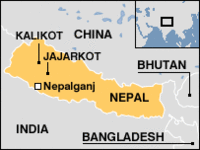By Sushil Sharma BBC News, Kathmandu |
The soldiers were captured following a rebel attack on an army barracks in the west of the country in early August.
The International Committee of the Red Cross (ICRC) negotiated the release of the soldiers.
The release comes two weeks after the rebels declared a unilateral three month cease-fire.
The cease-fire has been widely welcomed across the country.
The government refuses to reciprocate.
'Good condition'
The soldiers were expected to arrive in the western town of Nepalgunj on Thursday after a two-day trek from the remote Jajarkot district where they had been freed in the presence of Red Cross representatives.
The rebels had captured the soldiers following a fierce attack on an army barracks in the neighbouring Kalikot district.
Fifty-five soldiers and 26 rebels died in the fighting.
A BBC reporter in the region says the freed soldiers are in good condition.
National and international human right groups had urged the rebels to unconditionally free the soldiers.
The rebels had earlier pledged to free them at "an appropriate time".
'Increased pressure'
The government is refusing to join in the rebels' ceasefire because it says the Maoists cannot be trusted.
Analysts say the move to release the soldiers at this point of time could increase pressure on the government to reciprocate the peace moves.
Twelve thousand people have been killed since the rebel insurgency began 10 years ago.
The rebels say they want an interim government and elections for a constituent assembly to draft a new constitution.
This, they say, will clear the way for replacing the monarchy with a people's republic. Sphere: Related Content



No comments:
Post a Comment